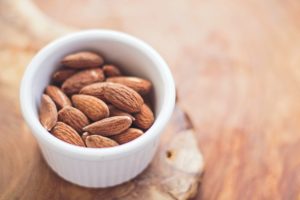Food and Mood
Back to BlogLet food be thy medicine and medicine be thy food
You would have heard the expression you are what you eat. It certainly holds some truth. Eating foods rich in vitamins and minerals really can affect the way we feel.
Below are a few considerations to ensure that you are eating well so your brain is functioning and not lacking any nutrients, which may make you more susceptible to low mood, depression or anxiety.
- Ensure you are eating a diet which includes adequate fat intake
- Ensure adequate fibre intake
- Include protein at every meal, adding in plant based amino acids where possible
- Keep hydrated
- Ensure your diet is rich in foods containing Magnesium, Vitamin B3, Tryptophan and Zinc


A diet Rich in Essential Fatty Acids
Our brains are made up of 50% fat. It is vital that our cells receive enough fat from our diets to ensure they function and maintain their structure. When cooking use a rapeseed oil (often sold as vegetable oil) or olive oil. Then when you have salads or roasted vegetables drizzle them with a higher quality extra virgin olive oil (which will be richer in antioxidants called polyphenols). The fat also assists with the uptake of fat soluble vitamins into our cells, for example vitamin A which is a skin healthy vitamin.
Include only minimal high fat and high salt processed foods as there is evidence that these can cause harm to our brain structure and also damage our heart health when eaten in excess.
Instead include fats from sources such as nuts; walnuts, almonds which are all beneficial, nuts are also rich in the antioxidant vitamin E and contain gut healthy fibre. Brazil nuts have the added benefit of being a source of selenium. Being deficient in selenium has been known to impact mood and increase the incidence of feeling depressed. Additionally flax seeds/linseeds and chia seeds all contain omega-3 fatty acids.
Adequate Fibre for Mind and Gut Health
Dietary fibre found in plants and whole grains are resistant to digestion and absorption in the small intestine. Instead these are broken down by bacteria in the large intestine. Fibre is important in our diets and there is a growing body of evidence which confirms its benefits. For example, fibre lowers blood cholesterol, prevents colorectal cancer, diabetes and heart disease. It also assists with regular gut function.
Whole grain rich cereals contain B vitamins (Thiamin B1, Niacin B3 or Cobalamin B12), which if we are deficient in them can lead to irritability, lethargy and depression. Adults should aim for 30g of dietary fibre within our diets daily, tips to ensure you achieve this; choose wholegrain where possible (including, bread, rice and pasta), include a high fibre breakfast with plenty of seeds and nuts, add pulses and extra vegetables into dishes (i.e lasagna, burritos, rice dishes, soups), snack on fruit, nuts and seeds throughout the day and ensure to leave the skins on fruits and vegetables where possible.

Protein at every meal, Plant based Amino Acids
Include with every meal a protein source. This protein can come from plant based protein sources such as tofu or tempeh, beans, chickpeas, seeds, lentils, nuts and nut butters (almond or peanut butter) or from an animal sources such as chicken or lean meats such as pork or beef, eggs and dairy. Additionally protein sources from seafood, fish, in particular oily fish mackerel, salmon or shellfish such as prawns or crayfish have the additional benefit from providing the antioxidant astaxanthin which assists in preventing cellular damage, also assisting in skin health.
There is a messenger chemical in our bodies called serotonin which assists to improve our mood and how we feel. Serotonin is made with a part of protein from the diet (tryptophan). Tryptophan is an amino acid that is important for the production of serotonin in the body. It is also key to brain function and has a role in healthy sleep. As we cannot make tryptophan within our bodies, we must obtain it from diet.
Stay Hydrated!
Every single system within our bodies down to our cellular function and brain function requires water.
Whilst we often tout the benefits for skin health, keeping hydrated is one of the most important things that you can do to keep well and to ensure your brain can function optimally. Water is essential a range of processes to take place within our bodies. Water assists with distributing the nutrients to our cells, assists with kidney function to ensure we can rid the body of waste products. Water ensures the blood supply functions to carry oxygen and glucose. Water also assists with our digestion and gut function, lubricates our joints and as you know keeps our skin healthy and glowing.
When you are dehydrated it reduces the ability for your brain to function which can result in mood disorders and feelings of heightened anxiety.
Ensure you get enough water throughout the day, make it a habit to always have a water bottle next to you and sip throughout the day. Additionally, include water rich foods in your diet such as cucumbers, kiwis, lettuce, peppers, oranges to name but a few. These also have the additional benefit of providing you with fibre, vitamins and minerals such as vitamin C (for collagen synthesis) and a wide range of antioxidants.

Food also tastes better when you eat it with Friends and Family.
So ensure your environment is calm and peaceful... Which we know this can be hard with little people around!


